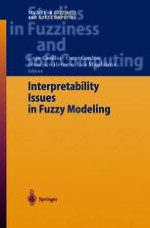2003 | OriginalPaper | Chapter
Interpretability, Complexity, and Modular Structure of Fuzzy Systems
Author : Marwan Bikdash
Published in: Interpretability Issues in Fuzzy Modeling
Publisher: Springer Berlin Heidelberg
Included in: Professional Book Archive
Activate our intelligent search to find suitable subject content or patents.
Select sections of text to find matching patents with Artificial Intelligence. powered by
Select sections of text to find additional relevant content using AI-assisted search. powered by
Zadeh’s original motivation for fuzzy logic and the Fuzzy Rule-Based System (FRBS) was linguistic and hence possessed highly interpretable components. But as the complexity of a typical FRBS increases, it often becomes more like an uninterpretable neural network, and the Principle of Incompatibility predicts a degradation in interpretability for the same accuracy. This is particularly true of the so-called Takagi-Sugeno-Kang (TSK), or simply the Sugeno, approximator. We argue that imposing additional structure on the TSK system can significantly improve the tradeoff inherent in the Principle of Incompatibility. A promising structure was proposed recently in which the membership functions are local and sufficiently differentiable, and the consequent polynomials are rule-centered. This structure leads to the general interpretation that the consequent polynomials are Taylor series expansions. On this interpretation, a foundation for an algebra and a calculus of FRBSs can be built. We will illustrate these aspects of the proposed structure and discuss issues of modularity, functionality, and scalability of FRBSs.
